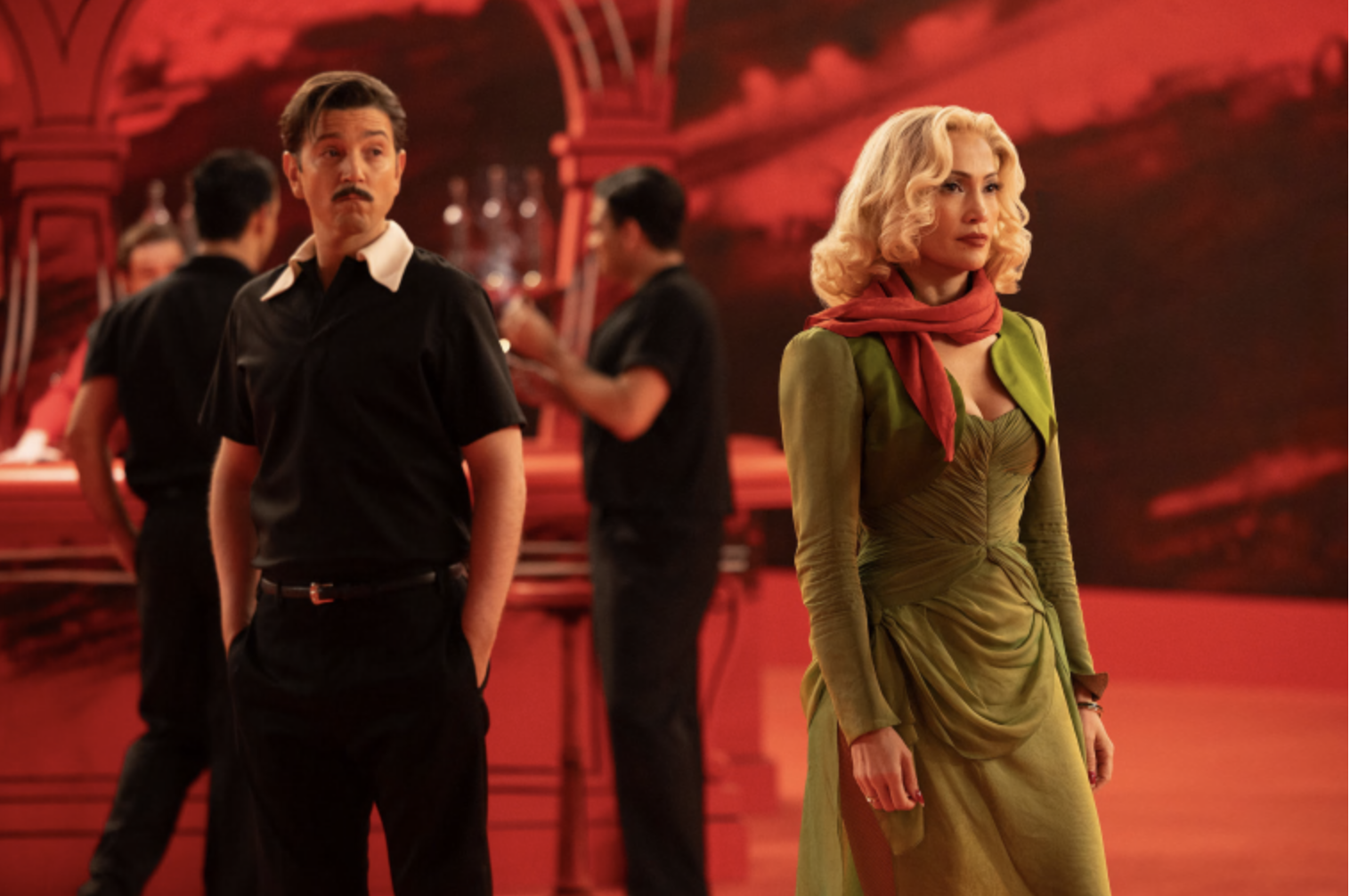KISS OF THE SPIDER WOMAN
Directing: B
Acting: B+
Writing: B-
Cinematography: B
Editing: B
Music: B
I can’t quite decide what to make of Kiss of the Spider Woman, which is a 2025 movie musical adaptation of a 1993 stage musical adaptation of a 1976 novel that was already adapted into a 1985 film drama. This much I can say with confidence: this new film is not going to make much in box office revenue, and it’s certainly not going to be remembered the way the 1985 film was—or even, in all likelihood, the 1993 stage musical was. This movie is going to come and go, less forgotten than widely ignored.
It’s too bad, because the movie isn’t bad. It’s just also unremarkable, save perhaps for some of the performances. It seems Jennifer Lopez can’t catch a break when it comes to her film career—she rightfully garnered awards buzz for the 2019 film Hustlers, but nothnig really came of it; she’s been doing her best ever since. Here she plays the title character, which is ironic on two levels: she represents a character in a fantasy escape from the Argentinian prison “real world of the film,” but the title character isn’t even the main character of that fantasy. On the plus side, she also plays Aurora, the heroine of the movie musical whose story is being told by prisoner Luis Molina (Tonatiuh), to his cellmate Valentin (Diego Luna).
A huge element of this story is that Music is gay, and Valentin is straight—or, so it would seem from the start. There’s a lot about the evolution of queer identity politics since the seventies that this film does not bother to acknowledge, most notably Luis’s desire to be a woman. Even without the very vocabulary to articular trans identity, Kiss of the Spider Woman manages to give no solid indication of whether we should fundamentally regard Luis as a man or a woman (or even neither). From the context of the script, one could even assume we’re meant to think of Luis as a gay man who simply lionizes women. This remains the case even when, predictably and inevitably, we get to what amounts to a dream sequence—and a beautiful one—featuring Luis as a woman (or Tonatiuh, who is openly queer, in drag).
And then there is the relationship that evolves between these two characters, which leans hard into a direction I wasn’t quite expecting. And what are the implications, then, of Valentin’s identity and sexuality? Perhaps the ambiguity is the point, but turning this story into a musical strips it of much of its nuance, leaning further instead into the escapist fantasy that Luis regales Valentin with. Valentin begins by judging the story’s stereotypes and tropes, and he’s not exactly wrong. But, he also eventually gets into the story, which the film we are watching cuts back and forth between, and eventually finds that even this story has some twists he did not quite expect.
The 1985 film adaptation starred William Hurt as Luis and Raul Julia as Valentin, and was critically adored. I may watch it soon, but I made the right choice not watching it just before seeing this new adaptation, which almost certainly would only suffer for it. The lush colors of the production design in the movie-within-a-movie (that being what makes this a musical) are well executed, and Jennifer Lopez in particular is fitted into several beautifully designed dresses. The choreography may have been hard work to execute but just looks all right onscreen, and here is the kicker considering the musical genre: the music itself is merely fine. Not bad; it serves its purpose—but the music itself is what makes or breaks a musical, and there’s not a single iconic tune to be found here. I can’t remember a single line right now, and I saw the film a couple of hours ago.
Lopez delivers the songs flawlessly, though. Diego Luna is great as ever, though I have some slight ambivalence about Tonatiuh’s performance. Tonatiuh being openly queer doesn’t change how exaggerated Luis’s effeminate demeanor feels, especially when we first meet them. It may very well that this is in keeping with the tradition of this story—maybe this is how Luis is described in the novel; maybe it’s how Luis is performed onstage. But, like most people who see this movie, I don’t have those comparison points at hand, and it feels here like a character trait that gets over-indulged, as though trying to telegraph to the back of the house that this person is queer.
Still, Kiss of the Spider Woman has some pointedly timely story elements, most significant among them being the setting of the final stage of Argentinian dictatorship—and some pointed reflections of where others in the world may be headed. Again, none of this has any time or space to be fully fleshed out because of all that gets reserved for song-and-dance routines. In the end, Kiss of the Spider Woman is a movie with something to say but an inability to say it with clarity.
Looks like Diego Luna has eyes for Jenny from the Block,
Overall: B

